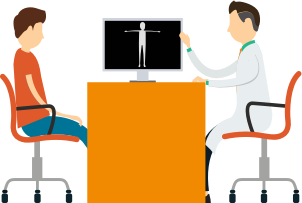ALS Resources
There's Always More to Learn
Below you’ll find a range of downloadable ALS resources for patients and caregivers that may help you better understand and manage your disease.
ALS Pathways Webinars
Educational webinars featuring an ALS expert sharing his perspective on topics many patients and caregivers want to learn more about.
Educational webinars featuring an ALS expert sharing his perspective on topics many patients and caregivers want to learn more about.
ALSFRS-R Input Tool
A tool that reports ALSFRS-R scores, a widely used scale that measures and tracks physical function.
A tool that reports ALSFRS-R scores, a widely used scale that measures and tracks physical function.
ALS Pathways Patient Podcast Series
Insights on a variety of ALS topics for download to your computer or mobile device. Check back for new installments regularly.
Insights on a variety of ALS topics for download to your computer or mobile device. Check back for new installments regularly.
Getting Started Brochure
Useful information for those recently diagnosed with ALS. Includes the basics of ALS, tools that may help monitor ALS, and strategies for living with ALS.
Useful information for those recently diagnosed with ALS. Includes the basics of ALS, tools that may help monitor ALS, and strategies for living with ALS.
Keeping Track of Healthcare Providers
A form to write down and store contact info, instructions, and next steps from your healthcare providers.
A form to write down and store contact info, instructions, and next steps from your healthcare providers.
Educational Webinars
An Expert’s Point of View
Learn more as a doctor with years of experience treating ALS patients offers his insights on loss of function associated with ALS as well as how clinical trials play a role in ALS treatment.

An ALS Expert's Perspective on Assessing and Slowing the Loss of Function in ALS

An ALS Expert's Perspective on The Clinical Trial Process
ALSFRS-R Input Tool
Stay on Top of Your Needs
Every person with ALS experiences symptoms differently.1
The ALSFRS-R scale is a questionnaire used in clinical trials to measure the impact of ALS on an individual. The test measures a person’s physical function across 12 activities of daily living (ADLs) on a scale from 4 (normal) to 0.2
Please answer the short series of questions below based on the ALSFRS-R scale.2 Once complete, click submit to generate a list of tips and information that may help you understand and manage symptoms.
Tip: It can be helpful to fill out the Input Tool with your caregiver or healthcare provider(s). They may have a unique perspective on how you're able to complete daily functions.
The ALSFRS-R scale is a questionnaire used in clinical trials to measure the impact of ALS on an individual. The test measures a person’s physical function across 12 activities of daily living (ADLs) on a scale from 4 (normal) to 0.2
Please answer the short series of questions below based on the ALSFRS-R scale.2 Once complete, click submit to generate a list of tips and information that may help you understand and manage symptoms.
Tip: It can be helpful to fill out the Input Tool with your caregiver or healthcare provider(s). They may have a unique perspective on how you're able to complete daily functions.
- Choose the answer that best describes
your ability to perform each activityRemember, your ALSFRS-R score will change over time. Retaking the questionnaire can help ensure the information stays relevant as symptoms progress. - Question 1 of 12Best describe your ability to speakI’m able to speak normally.I’m starting to have speech disturbances (Examples may include slow, slurred, or unclear speech; difficulty managing the pitch, tone, or rhythm of your voice; speaking softly or faintly, etc).1I must repeat myself for people to understand me.My speech is now combined with nonverbal communication (Examples may include pen and paper, picture board, or more advanced computer interfaces).2I’ve lost my ability to speak.1. Flavell L. Living with ALS: speech and communication. ALS News Today website. https://alsnewstoday.com/living-with-als/speech-and-communication. Accessed February 1, 2018. 2. Communication guide. ALS Association website. www.alsa.org/als-care/augmentative- communication/communication-guide.html. Accessed February 1, 2018.
By submitting this form, you agree to Mitsubishi Tanabe Pharma America's Terms of Use and give Mitsubishi Tanabe America and companies working with us permission to communicate with you about ALS and other educational materials via email and to use your personal information as specified in the Privacy Policy. We will not sell or transfer your personally identifiable information to any party for its own marketing use. - Question 2 of 12Best describe your salivationMy salivation is normal.I have a slight but definite excess of saliva in my mouth; this may include nighttime drooling.I have moderately excessive saliva; this may include minimal drooling.I have an excess of saliva with some drooling.I'm experiencing drooling and I require constant use of a tissue or handkerchief.By submitting this form, you agree to Mitsubishi Tanabe Pharma America's Terms of Use and give Mitsubishi Tanabe America and companies working with us permission to communicate with you about ALS and other educational materials via email and to use your personal information as specified in the Privacy Policy. We will not sell or transfer your personally identifiable information to any party for its own marketing use.
- Question 3 of 12Describe your ability to swallowI’m able to eat normally.I’ve begun to experience problems eating, such as occasional choking.I now make changes to the consistency of food and/or liquid so they’re easier to consume or swallow.I use supplemental tube feeding, such as a PEG tube.I’m unable to consume food or drink by mouth, and now exclusively use a PEG tube or get nutrients delivered through the veins (intravenously) directly into the blood.11. Home parenteral nutrition. Mayo Clinic website. www.mayoclinic.org/testsprocedures/total-parenteral- nutrition/home/ovc-20317700. Accessed October 31, 2017.
By submitting this form, you agree to Mitsubishi Tanabe Pharma America's Terms of Use and give Mitsubishi Tanabe America and companies working with us permission to communicate with you about ALS and other educational materials via email and to use your personal information as specified in the Privacy Policy. We will not sell or transfer your personally identifiable information to any party for its own marketing use. - Question 4 of 12Describe your handwritingMy handwriting is normal.I write slowly or sloppily, but all words are legible.When I write, not all words are legible.I’m able to grip a pen but unable to write.I’m unable to grip a pen.By submitting this form, you agree to Mitsubishi Tanabe Pharma America's Terms of Use and give Mitsubishi Tanabe America and companies working with us permission to communicate with you about ALS and other educational materials via email and to use your personal information as specified in the Privacy Policy. We will not sell or transfer your personally identifiable information to any party for its own marketing use.
- Question 5 of 12Describe your ability to cut food and handle utensilsI’m able to cut food and handle utensils normally.It’s somewhat slow and clumsy, but I don’t need help.I can cut most foods, although it’s slow and clumsy; I need some help.My food must be cut by someone, but I can still feed myself slowly.I need to be fed.By submitting this form, you agree to Mitsubishi Tanabe Pharma America's Terms of Use and give Mitsubishi Tanabe America and companies working with us permission to communicate with you about ALS and other educational materials via email and to use your personal information as specified in the Privacy Policy. We will not sell or transfer your personally identifiable information to any party for its own marketing use.
- Question 6 of 12Describe your ability to dress yourself and maintain hygieneI’m able to dress myself and maintain hygiene normally.I’m independent and able to completely care for myself but with added effort or decreased efficiency.I occasionally need assistance and/or must make substitutions to my normal methods.I need an attendant to assist me with self-care.I’m totally dependent on the help of someone else.By submitting this form, you agree to Mitsubishi Tanabe Pharma America's Terms of Use and give Mitsubishi Tanabe America and companies working with us permission to communicate with you about ALS and other educational materials via email and to use your personal information as specified in the Privacy Policy. We will not sell or transfer your personally identifiable information to any party for its own marketing use.
- Question 7 of 12Describe your ability to turn in bed and adjust your bed clothesI’m able to turn in bed and adjust my bed clothes normally.It feels somewhat slow and awkward, but I don’t need help.I can turn alone or adjust my sheets, but with great difficulty.I can begin to turn or adjust my sheets, but can’t do it alone.I am unable to turn or adjust sheets.By submitting this form, you agree to Mitsubishi Tanabe Pharma America's Terms of Use and give Mitsubishi Tanabe America and companies working with us permission to communicate with you about ALS and other educational materials via email and to use your personal information as specified in the Privacy Policy. We will not sell or transfer your personally identifiable information to any party for its own marketing use.
- Question 8 of 12Describe your ability to walkI am able to walk normally.I am beginning to experience difficulty walking (Examples may include muscle twitches, muscle cramps, tightness or stiffness in muscles, or weakness).1I need assistance walking (Examples may include ankle-foot orthosis, canes, walkers, or wheelchairs).2I am unable to walk functionally.I am unable to produce any useful leg movement.1. Amyotrophic lateral sclerosis (ALS) fact sheet. National Institute of Neurological Disorders and Stroke website. www.ninds.nih.gov/disorders/patient-caregiver-education/fact-sheets/amyotrophic-lateral-sclerosis-als-fact-sheet. Accessed February 1, 2018. 2. Improving mobility. ALS Association Texas Chapter website. www.alstexas.org/navigating-als/for-patients/improving-mobility/. Accessed February 1, 2018.
By submitting this form, you agree to Mitsubishi Tanabe Pharma America's Terms of Use and give Mitsubishi Tanabe America and companies working with us permission to communicate with you about ALS and other educational materials via email and to use your personal information as specified in the Privacy Policy. We will not sell or transfer your personally identifiable information to any party for its own marketing use. - Question 9 of 12Describe your ability to climb stairsI’m able to climb stairs normally.I am able to climb stairs but at a slower pace than normal.I feel mild unsteadiness or fatigue when climbing stairs.I can climb stairs but I need assistance.I am unable to climb stairs.By submitting this form, you agree to Mitsubishi Tanabe Pharma America's Terms of Use and give Mitsubishi Tanabe America and companies working with us permission to communicate with you about ALS and other educational materials via email and to use your personal information as specified in the Privacy Policy. We will not sell or transfer your personally identifiable information to any party for its own marketing use.
- Question 10 of 12Describe your experience with shortness of breath (known medically as dyspnea)I have not experienced shortness of breath.I experience shortness of breath when I am walking.I experience shortness of breath during one or more of the following: eating, bathing, dressing (activities of daily living).I experience shortness of breath when I am resting, either while I am sitting or lying down.I am experiencing a significant amount of shortness of breath, and I am considering or currently using some type of mechanical respiratory support, such as a bilevel positive airway pressure (BIPAP) machine.By submitting this form, you agree to Mitsubishi Tanabe Pharma America's Terms of Use and give Mitsubishi Tanabe America and companies working with us permission to communicate with you about ALS and other educational materials via email and to use your personal information as specified in the Privacy Policy. We will not sell or transfer your personally identifiable information to any party for its own marketing use.
- Question 11 of 12Describe your experience with breathing difficulty while lying down (known medically as orthopnea)I have not experienced difficulty breathing while lying down.I have some difficulty sleeping at night due to shortness of breath. I do not routinely use more than 2 pillows to elevate my head or upper body for respiratory relief.I need more than 2 pillows to elevate my head or upper body to find relief so I can sleep.I can only sleep sitting up.I am unable to sleep.By submitting this form, you agree to Mitsubishi Tanabe Pharma America's Terms of Use and give Mitsubishi Tanabe America and companies working with us permission to communicate with you about ALS and other educational materials via email and to use your personal information as specified in the Privacy Policy. We will not sell or transfer your personally identifiable information to any party for its own marketing use.
- Question 12 of 12Describe any respiratory insufficiency (reliance on mechanical respiratory support)I do not rely on mechanical respiratory support.I occasionally use a bilevel positive airway pressure (BIPAP) machine.I continuously use BIPAP during the night.I continuously use BIPAP during the night and day.I’ve undergone invasive mechanical ventilation with a tube inserted into my trachea.By submitting this form, you agree to Mitsubishi Tanabe Pharma America's Terms of Use and give Mitsubishi Tanabe America and companies working with us permission to communicate with you about ALS and other educational materials via email and to use your personal information as specified in the Privacy Policy. We will not sell or transfer your personally identifiable information to any party for its own marketing use.
How the ALSFRS-R Input Tool Works
The ALSFRS-R scaleThis input tool is based on the ALSFRS-R scale, a widely used test in clinical trials to track ALS.2 Learn more
Your unique score
Your ALSFRS-R score, which you should receive from your healthcare provider(s), is divided into 12 activities for daily living (ADL).2 Simply input each of your 12 ADL scores into the tool above.
As your ALSFRS-R score changes over time, come back and input your new numbers.
The information and advice provided here are general in nature and are not intended to be a substitute for professional medical advice, diagnosis, or treatment. You are strongly encouraged to seek the advice of your doctor or other qualified healthcare provider with any questions regarding a medical condition.
Patient Podcast
Series
Series
ALS Podcast: Stop, Listen, and Learn
The convenient, multipart ALS Pathways Podcast Series covers a range of ALS-related topics. Each episode explores a new and interesting subject: learn more about the science of ALS, how to prepare for and manage symptoms, and tips for both patients and caregivers.
The ALS Pathways Podcasts are free audio files that you can stream or download using your smartphone, tablet device, or desktop computer. Each episode in this series is about 10 minutes. Podcasts are a great way to get practical information wherever you are.
The ALS Pathways Podcasts are free audio files that you can stream or download using your smartphone, tablet device, or desktop computer. Each episode in this series is about 10 minutes. Podcasts are a great way to get practical information wherever you are.
- ALS: The Basics00:21:00Welcome to the ALS Pathways Podcast Series. In this podcast, we’ll discuss the basics of ALS, including the history and science behind the disease. We’ll review different groups of ALS symptoms and learn about tests used to track and monitor progression.
- Managing ALS00:27:49As ALS progresses, you will be faced with important decisions about your health. In the second podcast, we’ll review important strategies to help navigate your disease, including the importance of working with a multidisciplinary care team and tips for managing common symptoms.
- Life as a Caregiver00:25:25Are you a caregiver for someone with ALS? Learn about caring for a loved one throughout their ALS journey and, just as importantly, caring for your own physical and mental health.
Upcoming episodes include conversations with multidisciplinary specialists and people with ALS.
Check back for new episodes updated regularly.
What Would You Like to Hear?
Feel free to give us feedback on the ALS Pathways Podcast Series, or suggest a topic you’d like us to cover.
The information and advice provided here are general in nature and are not intended to be a substitute for professional medical advice, diagnosis, or treatment. You are strongly encouraged to seek the advice of your doctor or other qualified healthcare provider with any questions regarding a medical condition.
EMG Provider
Series
Series
Finding an EMG Specialist Near You
An electromyography (EMG) is an important series of tests that, along with other clinical evidence, can be used to help diagnose ALS.3
An EMG measures your nerve signaling and muscle response and can provide valuable insight when evaluating muscle weakness.3
When receiving an EMG, it's important to choose a physician who has completed training in electrodiagnostic (EDX) medicine. To help you find one, the American Association of Neuromuscular & Electrodiagnostic Medicine (AANEM) maintains a list of physicians who are certified in EDX by an independent board.
An EMG measures your nerve signaling and muscle response and can provide valuable insight when evaluating muscle weakness.3
When receiving an EMG, it's important to choose a physician who has completed training in electrodiagnostic (EDX) medicine. To help you find one, the American Association of Neuromuscular & Electrodiagnostic Medicine (AANEM) maintains a list of physicians who are certified in EDX by an independent board.
References: 1. Symptoms and diagnosis. ALS Association website. www.alsa.org/about-als/symptoms.html. Accessed February 1, 2018. 2. Cedarbaum JM, Stambler N, Malta E, et al. The ALSFRS-R: a revised ALS functional rating scale that incorporates assessments of respiratory function. J Neurol Sci. 1999;169(1-2):13-21. 3. The role of electromyography (EMG) in ALS. Massachusetts General Hospital website. www.massgeneral.org/als/patienteducation/ALSelectromyography.aspx. Accessed February 12, 2018.


